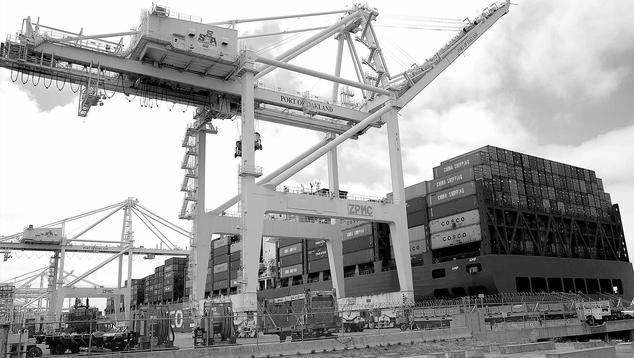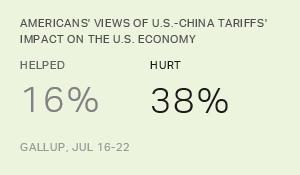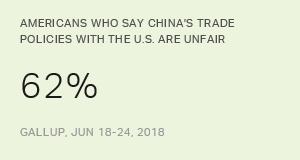Story Highlights
- 51% say trade has positive effect on jobs for U.S. workers
- Americans most likely to see trade as helping innovation, economic growth
- Seven in 10 say child labor laws should be taken into account for trade
WASHINGTON, D.C. -- Americans tilt toward the belief that trade with other countries has a positive (51%) rather than a negative effect (42%) on jobs for U.S. workers. Larger majorities see trade as benefiting product innovation, U.S. economic growth, prices, American businesses and product quality.
| Mostly positive | Mostly negative | ||||||||||||||||||||||||||||||||||||||||||||||||||||||||||||||||||||||||||||||||||||||||||||||||||
|---|---|---|---|---|---|---|---|---|---|---|---|---|---|---|---|---|---|---|---|---|---|---|---|---|---|---|---|---|---|---|---|---|---|---|---|---|---|---|---|---|---|---|---|---|---|---|---|---|---|---|---|---|---|---|---|---|---|---|---|---|---|---|---|---|---|---|---|---|---|---|---|---|---|---|---|---|---|---|---|---|---|---|---|---|---|---|---|---|---|---|---|---|---|---|---|---|---|---|---|
| % | % | ||||||||||||||||||||||||||||||||||||||||||||||||||||||||||||||||||||||||||||||||||||||||||||||||||
| Innovation and the development of new products | 70 | 22 | |||||||||||||||||||||||||||||||||||||||||||||||||||||||||||||||||||||||||||||||||||||||||||||||||
| U.S. economic growth | 67 | 27 | |||||||||||||||||||||||||||||||||||||||||||||||||||||||||||||||||||||||||||||||||||||||||||||||||
| The prices Americans pay for products | 63 | 32 | |||||||||||||||||||||||||||||||||||||||||||||||||||||||||||||||||||||||||||||||||||||||||||||||||
| American businesses | 61 | 33 | |||||||||||||||||||||||||||||||||||||||||||||||||||||||||||||||||||||||||||||||||||||||||||||||||
| The quality of products | 58 | 35 | |||||||||||||||||||||||||||||||||||||||||||||||||||||||||||||||||||||||||||||||||||||||||||||||||
| Jobs for U.S. workers | 51 | 42 | |||||||||||||||||||||||||||||||||||||||||||||||||||||||||||||||||||||||||||||||||||||||||||||||||
| Gallup, Feb. 12-28, 2019 | |||||||||||||||||||||||||||||||||||||||||||||||||||||||||||||||||||||||||||||||||||||||||||||||||||
The results are based on a Feb. 12-28 Gallup poll, which probed Americans' views on trade. Americans make little distinction in the extent to which trade influences each of these aspects of the economy -- between 56% and 64% say trade affects each "a great deal," including 63% saying it has this much impact on jobs for U.S. workers.
Americans' broad perspective on trade has become increasingly positive in recent years. This year, 74% say they view trade more as an opportunity for economic growth than as a threat to the U.S. economy from imports -- the highest Gallup has measured to date by two percentage points. As recently as 2012, Americans were divided on this question, and in 2008 the majority viewed trade as more of a threat than an opportunity.
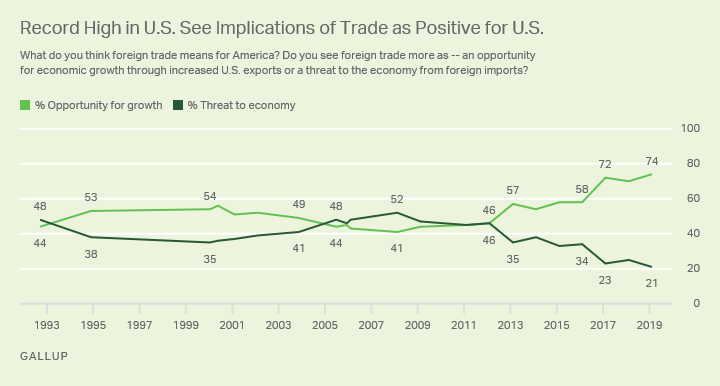
Party, Union Membership Not Strongly Linked to Opinions of Trade
Republicans, Democrats and independents all view trade as an opportunity for the U.S. and have similar attitudes about the effects it has on the U.S. For example, 70% of Republicans, 75% of independents and 79% of Democrats believe trade represents an opportunity for the U.S. rather than a threat. Typically, there have not been large party differences in views of trade.
With respect to the impact of trade on jobs, 54% of Republicans, 51% of independents and 50% of Democrats believe trade has a positive effect rather than a negative effect.
Union membership also does not relate strongly to how one assesses the impact of trade on job opportunities. Americans living in households in which at least one resident is a union member are evenly divided as to whether trade has a positive (47%) or negative impact (47%) on jobs for U.S. workers. Among those in non-union households, 52% believe trade benefits the U.S. job market while 41% disagree.
Opinions about the impact of trade on jobs do show meaningful variation by gender and age, with men more positive than women, and older Americans more positive than younger adults. Consequently, there are large differences in the way younger women and older men assess the impact of trade on jobs -- 67% of older men, but only 39% of younger women, believe trade has a positive effect on U.S. jobs.
| Mostly positive | Mostly negative | ||||||||||||||||||||||||||||||||||||||||||||||||||||||||||||||||||||||||||||||||||||||||||||||||||
|---|---|---|---|---|---|---|---|---|---|---|---|---|---|---|---|---|---|---|---|---|---|---|---|---|---|---|---|---|---|---|---|---|---|---|---|---|---|---|---|---|---|---|---|---|---|---|---|---|---|---|---|---|---|---|---|---|---|---|---|---|---|---|---|---|---|---|---|---|---|---|---|---|---|---|---|---|---|---|---|---|---|---|---|---|---|---|---|---|---|---|---|---|---|---|---|---|---|---|---|
| % | % | ||||||||||||||||||||||||||||||||||||||||||||||||||||||||||||||||||||||||||||||||||||||||||||||||||
| Men ages 18 to 49 | 51 | 41 | |||||||||||||||||||||||||||||||||||||||||||||||||||||||||||||||||||||||||||||||||||||||||||||||||
| Men ages 50+ | 67 | 27 | |||||||||||||||||||||||||||||||||||||||||||||||||||||||||||||||||||||||||||||||||||||||||||||||||
| Women ages 18 to 49 | 39 | 52 | |||||||||||||||||||||||||||||||||||||||||||||||||||||||||||||||||||||||||||||||||||||||||||||||||
| Women ages 50+ | 49 | 47 | |||||||||||||||||||||||||||||||||||||||||||||||||||||||||||||||||||||||||||||||||||||||||||||||||
| Gallup, Feb. 12-28, 2019 | |||||||||||||||||||||||||||||||||||||||||||||||||||||||||||||||||||||||||||||||||||||||||||||||||||
Men and women also differ in their assessments of whether trade benefits other aspects of the economy beyond jobs, however, there are not consistent age differences. Education and income are also related to views of trade on each of the dimensions, with college graduates and upper-income Americans more likely to see trade as being beneficial. Over time, opinions about trade have consistently varied by educational attainment.
The largest subgroup difference is a 22-point difference between upper- and lower-income Americans in their beliefs that trade has a positive impact on prices for products sold in the U.S.
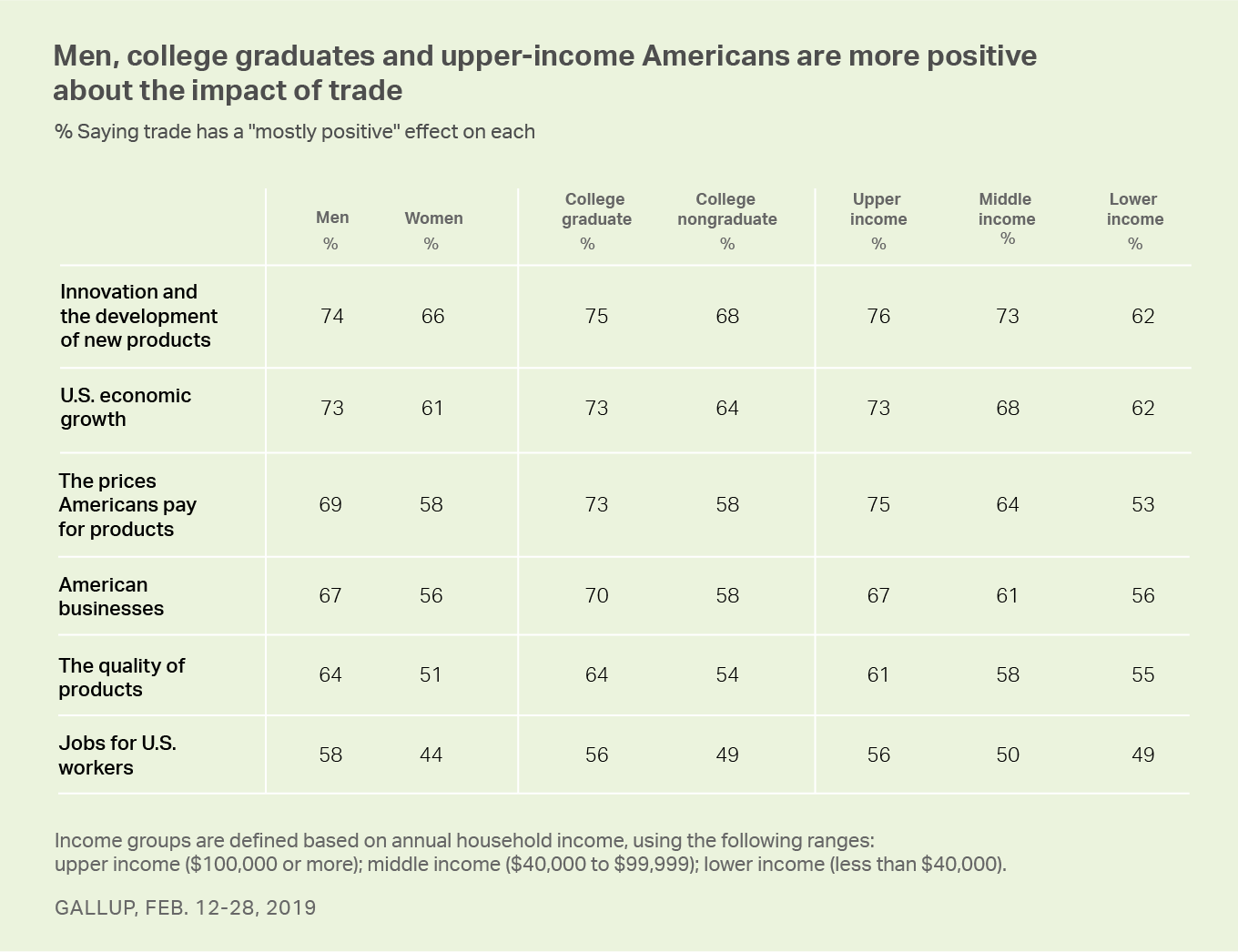
Public Says U.S. Should Consider Non-Economic Factors in Trade Decisions
Americans believe the U.S. should take other factors into account beyond the potential economic benefit when deciding to trade with other countries. Seventy-two percent say the U.S. should take a country's child labor laws into account "a great deal." Two-thirds say the same about a country's record on human rights, and slightly less say it should take account of a country's laws on worker health and safety. A slim majority believes a country's record on the environment should be taken into account a great deal.
| A great deal | A moderate amount | Only a little | Not at all | ||||||||||||||||||||||||||||||||||||||||||||||||||||||||||||||||||||||||||||||||||||||||||||||||
|---|---|---|---|---|---|---|---|---|---|---|---|---|---|---|---|---|---|---|---|---|---|---|---|---|---|---|---|---|---|---|---|---|---|---|---|---|---|---|---|---|---|---|---|---|---|---|---|---|---|---|---|---|---|---|---|---|---|---|---|---|---|---|---|---|---|---|---|---|---|---|---|---|---|---|---|---|---|---|---|---|---|---|---|---|---|---|---|---|---|---|---|---|---|---|---|---|---|---|---|
| % | % | % | % | ||||||||||||||||||||||||||||||||||||||||||||||||||||||||||||||||||||||||||||||||||||||||||||||||
| A country's child labor laws | 72 | 13 | 7 | 6 | |||||||||||||||||||||||||||||||||||||||||||||||||||||||||||||||||||||||||||||||||||||||||||||||
| A country's record on human rights | 66 | 20 | 9 | 5 | |||||||||||||||||||||||||||||||||||||||||||||||||||||||||||||||||||||||||||||||||||||||||||||||
| A country's laws on worker health and safety | 62 | 23 | 9 | 5 | |||||||||||||||||||||||||||||||||||||||||||||||||||||||||||||||||||||||||||||||||||||||||||||||
| A country's record on the environment | 53 | 27 | 12 | 8 | |||||||||||||||||||||||||||||||||||||||||||||||||||||||||||||||||||||||||||||||||||||||||||||||
| Gallup, Feb. 12-28, 2019 | |||||||||||||||||||||||||||||||||||||||||||||||||||||||||||||||||||||||||||||||||||||||||||||||||||
To a large degree, Americans in different subgroups exhibit similar attitudes on how much the U.S. should take these factors into account when trading with other countries. However, there are some notable subgroup differences, including:
- 68% of Democrats, but only 40% of Republicans, believe the U.S. should factor a country's record on the environment when contemplating new trade deals.
- Women (69%) are significantly more likely than men (55%) to say a country's worker health and safety laws should be a major consideration.
- Democrats (69%) and Republicans (56%) differ on the extent potential trading partners' worker health safety laws should be considered.
Implications
U.S. trade relations with other countries have come under increasing scrutiny from leaders as politically diverse as Donald Trump and Bernie Sanders in recent years. Trump's trade policies have created tensions between major U.S. trading partners such as China, Canada and European Union countries.
Nevertheless, Americans' opinions about trade are as positive as they have been in at least 25 years, and they see trade as being more beneficial than harmful to a lot of the aspects of the economy it affects. Americans are less likely to think trade has a positive impact on the job market, but still more see it as helping rather than hurting American workers' ability to get jobs.
The public is sensitive to some of the criticisms about trade, and agrees that potential trading partners' laws, norms, and practices toward its workers, its citizens, and the environment should be taken into account.
The positive outlook on trade appears to be primarily a reaction to improving economic conditions in recent years, particularly the job market. To a lesser extent, the more positive attitudes may also reflect different partisan reactions to President Trump's trade policies that lead both groups to view trade in a positive light. Republicans may see Trump's renegotiation of the terms of the North American Free Trade Agreement and other trade relationships as being beneficial for the U.S. And while many Democrats agree with Trump's decision to withdraw the U.S. from the Trans-Pacific Partnership, they may disagree with his "America First" approach to foreign policy and see his attempts to modify international agreements on trade and other issues as not being in the country's best interests.
View complete question responses and trends.
Learn more about how the Gallup Poll Social Series works.
